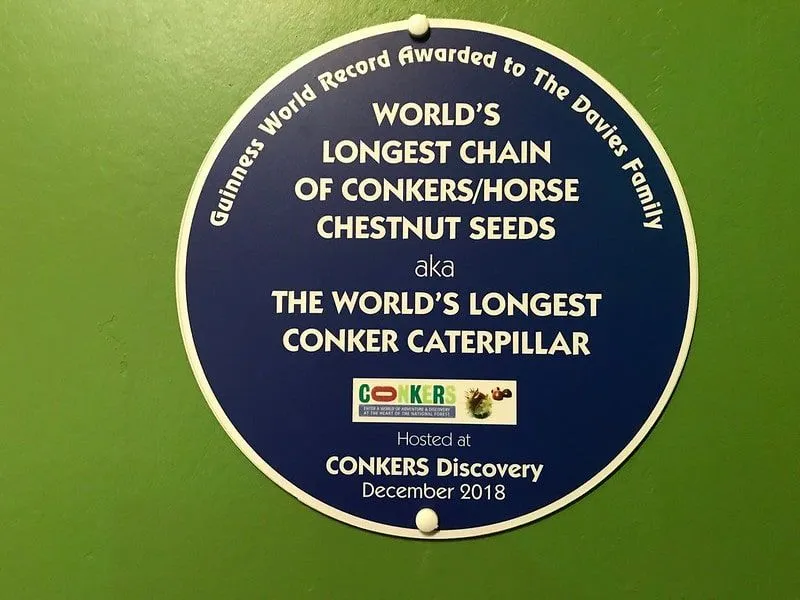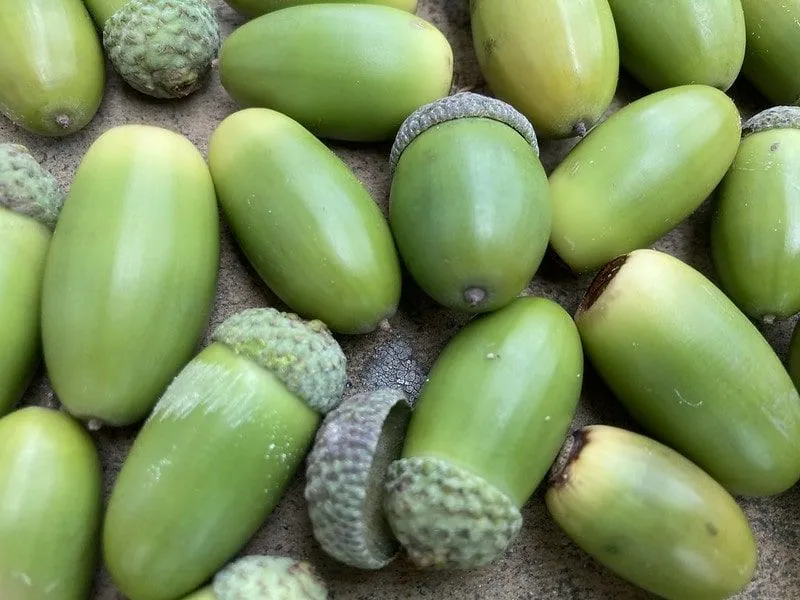FOR ALL AGES
Autumn brings all kinds of fun, if you’re the kind of family who enjoy messing about outdoors. We’ve put together five original, and slightly unusual ideas, for making the most of the leafy season.
What You’ll Need: A 4G-enabled phone or tablet, and some friends who have the same.
Where To Go: Any park, woods or open space with a good 4G signal. Or else you can do this at home over wifi.
What To Do: First of all, call up as many friends as you like via Zoom, WhatsApp or any other video chat service. You’ll need to pre-arrange it so that the friends are all in a similar environment (e.g. back garden, or park, or even a bedroom if the great outdoors is looking too miserable).
Next, someone is chosen as the “leader”. The leader should look around and spot an interesting object nearby. It might be a fallen pine cone, or a maple leaf, or a puddle, or (if indoors) a door handle. The leader should then shout “It’s a pine cone [or whatever]! Follow my lead!!”. Everyone else on the video call then has to run around looking for a similar object in their own vicinity. Whoever finds it first becomes the new Leader, but not before everyone shares their own finds over the screen. And so the game goes on.
Health And Safety: If doing this outdoors, keep a close eye on your children to make sure they’re looking where they’re going while holding the phone/tablet (which should be in a protective case). You might want to be their “camera crew”, doing all the phone/tablet work while they’re free to explore and present.
What You’ll Need: A large, comedy magnifying glass. (Actually, it’s optional, and just a bit of fun.) You may also like to take a tupperware box for storing natural treasures, and a tree identification book or app.
Where To Go: Take the kids to the biggest, best woods within striking distance. If you can get to ancient woodland, then fantastic. Otherwise, a scrappy acre of trees on the edge of your local park will do just fine.
What To Do: Wander through the woods, brandishing your magnifying glass, looking out for interesting leaves. The aim is to collect as many differently shaped leaves as possible (preferably ones that haven’t gone all mulchy and maggoty). Each time you find a new shape, have a pause and see if you can identify the tree it fell from. Then, try to list with the kids everything you know about that type of tree, however sketchy (e.g. “It’s an oak, clearly… oaks have acorns, and are good for building ships. And didn’t one of our kings hide up an oak tree once…?). Write all this down in a log book. When you return home, review your notes, and read up about the trees you discovered. You can also take rubbings of the leaves, if you like.
Health And Safety: It’s fun and intellectually stimulating for kids to scavenge around below the trees, but just keep an eye out for nasties, such as rotting plant matter, brambles, nettles and dangerous litter.
What You’ll Need: Nothing whatsoever.
Where To Go: You must find a mature horse-chestnut tree. They’re not always easy to locate -- they don’t tend to grow in woods, and are not routinely planted as street trees. But most towns and villages have a few if you know where to look. The best bet is any reasonably old park (the Victorians loved planting horse chestnuts). A quick google should help you track one down if you don’t already know where they grow.
What To Do: This one’s a doddle, and a bit silly, based entirely on a “conker” pun. All you have to do is collect enough conkers to write “1066” in big, conkery numbers on the ground. You can do it with the shiny brown conkers themselves, or else use the spiky carapaces (or a mixture of both). While collecting the conkers, you can use the opportunity to tell the children everything you know about the Battle of Hastings and the Norman Conquest of England. If that would only take a few seconds, you can instead merry things along by singing the following ditty:
“1066! King William found some sticks. He made a boat that wouldn’t float. 1066!”. It’s not historically accurate, but I sang it as a child, and it made me happy.
Once you’ve made your “1066” out of conkers, take a photo and Tweet/Instagram it all over the place (and maybe hashtag us in at #Kidadl #WilliamTheConkerer). You can leave the conker/conquer joke behind for others to find afterwards.
In a related game, you could see how long a chain of conkers you can form along the ground. There’s actually a Guinness World Record for this, as I discovered at the Conkers woodland centre in Derbyshire.

Image by the author.
(It’s since been broken and stands at 16,847 conkers!)
And if all of this silliness has made you bonkers for conkers, check out some facts about them here.
Health And Safety: Never pull conkers from the tree -- use conkers that have already fallen. And watch out for spikes! Also, don’t assemble your numbers on a pathway or walking route. We wouldn’t want somebody to take a tumble.
What You’ll Need: Some kind of substitute cauldron. It could be a small metal pot, or a seaside bucket, or any 1-2 litre container that doesn’t have any holes.
Where To Go: Any park, garden or woodland.
What To Do: You’ll need to do a bit of prep for this one. While the kids are sleeping, or otherwise engaged, you need to draw up a potion recipe. You can pretend you’re Severus Snape if you like -- I won’t tell anyone. The recipe should include five to ten items that can be readily found in your local park or woodland of choice. These might include conkers, acorns, stones, ash keys, sycamore ‘helicopters’, daisies, pine cones, twigs, blackberries (if they’re still fruiting), or anything else you know to be growing nearby. Avoid anything that might be toxic, like mushrooms and unfamiliar berries, and never pick wild flowers unless they’re stupidly common like daisies or dandelions. Draw up the list into an attractive “Potion recipe” card.
When you’re ready, tell the kids that today is “Potion Class” and you need their help to source ingredients from the park. Head out as a family to look for all the ingredients on the list, putting them into the “cauldron” as you find them.
Once you’ve got everything, head back home and then turn on the theatrics (again, you could pretend to be Severus Snape if you can affect the nasally voice). Time to brew the potion. Get the kids to add a little water, then tap the side of the cauldron with a toy wand (or stick posing as a wand). Hey presto, your magic potion is ready. Pretend it’s an incredible growth potion for other plants, or an elixir that will bring toys to life (if rubbed into their feet), or some other fantastical outcome… just not for human consumption!
Health And Safety: It’s very important to emphasise that the potion should not be drank under any circumstances. Make sure you dispose of the “potion” afterwards, and don’t leave children unattended with it. If you’ve chosen your ingredients sensibly, it shouldn’t contain anything toxic, though there is a health risk from dirt and germs. As with anything these days, have a good hand wash afterwards.

Image by the author.
What You’ll Need: Some kind of tub or plastic bag, for we are going out collecting again.
Where To Go: Anywhere with oak trees, which is to say, most parks and woods.
What To Do: The idea here is to equip your kid’s smaller toys with new “fairy helmets”. (Acorn cups, to you and me.) So before you leave the house, ask your child to assemble all the smaller action figures they have into a group (you can pretend it’s like the scene in Toy Story, where Woody calls together all the toys for a meeting). These might include Lego figures, Playmobil, Sylvanian Families or (shudders) LOL Surprise dolls -- anything, really, that might realistically balance an acorn cup on its head. Now, tell the assembled troops that it’s time they all learned to ride a bike, and that you’re going to go out to the woods to get them all helmets.
You then head along to your nearest oak trees and collect as many acorn cups as you need. Look out for different sizes to match the varied figurines.
Bring the haul back home and then take time to choose a bespoke “fairy helmet” for each of the small toys. (By the way, it doesn’t have to be fairies. You can adapt the idea to “elf helmets”, “goblin helmets”, “Smurf helmets” or whatever resonates with your child.)
Now all the toys are kitted out with helmets, it’s up to you to figure out how the tiny bicycle lessons work -- perhaps use Lego or a small wheeled toy as a pretend bike.
Health And Safety: Again, only select cups that have already fallen off the tree. Keep a close eye on what’s being picked up, as some acorns can be rotten or contain grubs.
Read The Disclaimer
At Kidadl we pride ourselves on offering families original ideas to make the most of time spent together at home or out and about, wherever you are in the world. We strive to recommend the very best things that are suggested by our community and are things we would do ourselves - our aim is to be the trusted friend to parents.
We try our very best, but cannot guarantee perfection. We will always aim to give you accurate information at the date of publication - however, information does change, so it’s important you do your own research, double-check and make the decision that is right for your family.
Kidadl provides inspiration to entertain and educate your children. We recognise that not all activities and ideas are appropriate and suitable for all children and families or in all circumstances. Our recommended activities are based on age but these are a guide. We recommend that these ideas are used as inspiration, that ideas are undertaken with appropriate adult supervision, and that each adult uses their own discretion and knowledge of their children to consider the safety and suitability.
Kidadl cannot accept liability for the execution of these ideas, and parental supervision is advised at all times, as safety is paramount. Anyone using the information provided by Kidadl does so at their own risk and we can not accept liability if things go wrong.
Kidadl is independent and to make our service free to you the reader we are supported by advertising.
We hope you love our recommendations for products and services! What we suggest is selected independently by the Kidadl team. If you purchase using the buy now button we may earn a small commission. This does not influence our choices. Please note: prices are correct and items are available at the time the article was published.
Kidadl has a number of affiliate partners that we work with including Amazon. Please note that Kidadl is a participant in the Amazon Services LLC Associates Program, an affiliate advertising program designed to provide a means for sites to earn advertising fees by advertising and linking to amazon.
We also link to other websites, but are not responsible for their content.
Was this article helpful?

We’ll send you tons of inspiration to help you find a hidden gem in your local area or plan a big day out.



Check your inbox for your latest news from us. You have subscribed to:
Remember that you can always manage your preferences or unsubscribe through the link at the foot of each newsletter.